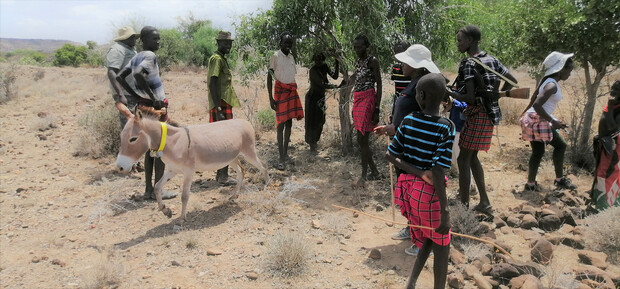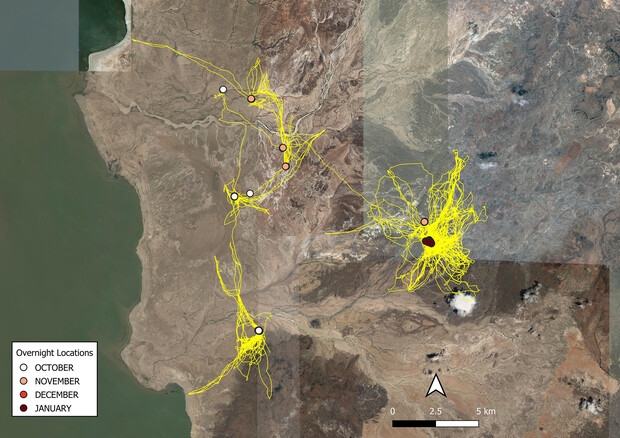Deann Gayman, March 1, 2021
Researchers find ways to push international research forward, despite COVID-19
The details were in place, and an international team of researchers was ready to launch a multi-year study of Kenya’s socio-ecological systems — specifically how globalization and climate change are impacting the country’s native Daasanach pastoralists.
Then, like dominoes, COVID-19 began spreading across the world, with new countries announcing cases, shutdowns and travel restrictions each day.
“We really had so many things geared up and prepared, and then suddenly, it became very unlikely that any of it was going to happen,” said Matthew Douglass, assistant professor of practice in the College of Agricultural Sciences and Natural Resources.
Douglass, the principal investigator of the four-year National Science Foundation grant, first attempted to keep field season dates rolling, with the hope of eventually being able to travel to the Koobi Fora Field School in Kenya, which serves as the home base for the research project.
Soon, though, Douglass had a sense of dread, and he and the team went back to the drawing board. The NSF offered an extension for the grant, but there were other implications — some far reaching — of not having their typical field season from May to July.
“We have a rapport with the community, who is used to seeing us, and some work for us,” Douglass said. “Some of our informants in the Daasanach community, with the pay we give them for their time, use that money for school fees for their children or for their own school fees. We also have staff in Kenya who work for us for those six weeks and it’s a huge part of their annual income, so it would be a big problem for them not to do this work with us.
“It became not only about losing a year of research and data collection, but also what’s going to happen with our research community, and how can we honor those obligations that we have?”

The scope of the planned research is wide. Rapid globalization and climate change — especially in the last 40 years — have produced uncertainty regarding food, water and habitat resources for the Daasanach and have altered their way of life. The changes the Daasanach have experienced are not happening in a vacuum, however; they are similar to challenges faced by grazing communities around the world. The international, interdisciplinary team conducting the research will provide data to local and international policymakers about the current ecological and cultural challenges, and will endeavor to predict outcomes.
With the planet continuously changing, Douglass felt it urgent that data collection go forward.
Through weekly meetings in the early months of 2020, Douglass and fellow grant investigator Larkin Powell, professor in the School of Natural Resources, went through the objectives of the research and decided which elements could still be done by utilizing all team members on the ground in Kenya, along with tools such as GPS, WhatsApp and Google Docs. They shifted the field season from May through July to September and October.
“Larkin and I, along with some of our other U.S. and Kenyan collaborators, decided what bits of data we’d really like to have, and that could be gathered by local researchers trained in different areas, who could learn new techniques to gather these data.” Douglass said. “We went through, step by step, and developed protocols and shared them on Google Docs. We also transferred them to apps available on smartphones.”
One of their research partners at the Koobi Fora School, Emmanuel Ndiema, senior research scientist and head of archaeology for the National Museums of Kenya, took on the role of both supervising the on-the-ground data collection, as well as filling in gaps for research where needed.
“Technology and the partnerships Matt’s developed allowed us to check in in real time and give feedback,” Powell said.
Using Zoom and WhatsApp, Douglass and Powell were able to establish daily communication with their partners in the field and had a successful season of data gathering. None of this would have been possible just a few years ago, due to a lack of stable internet access, but investments in satellite internet by the field school over the last three years opened the doors to remote work being possible, Douglass said.
The work this season focused on gathering medical information from the local clinic, working with communities to further detail pasture mapping and ground truthing of that, collaring livestock with GPS tracking, and interviewing on movement and pasture condition assessment.

“This is a much lower level of involvement than we would have had, had we had a proper field season, but we were able to keep contact going with the community and move the project forward in productive ways,” Douglass said.
Douglass is planning for a summer field season in 2021, with contingencies, and undergraduate students chosen for the Research Experience for Undergraduates opportunity within the grant will hopefully be able to participate, as well.
Despite the various obstacles that arose from COVID-19, Douglass sees opportunity to expand data collection beyond the typical field season, utilizing more technology and remote access pieces.
“I think this made us think a little differently and made us seize on an opportunity that will probably make our field work in the future even better,” Douglass said.
Agriculture COVID-19 Institute of Agriculture and Natural Resources





